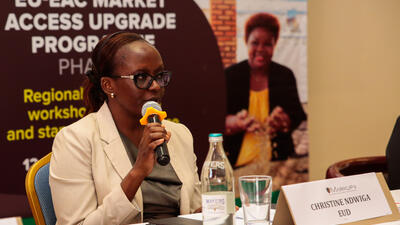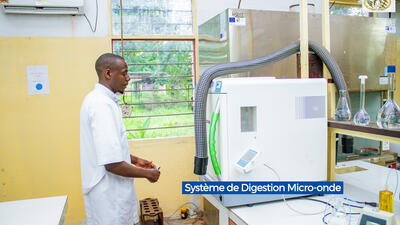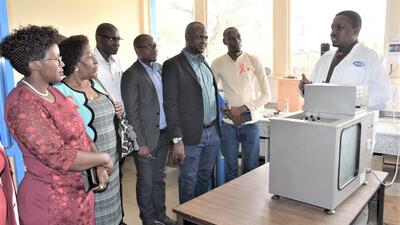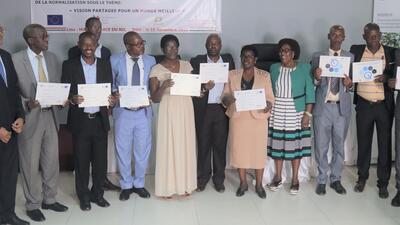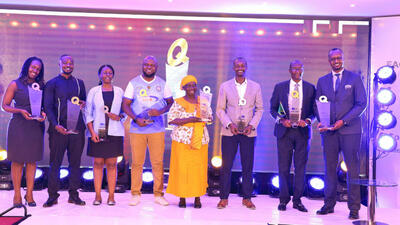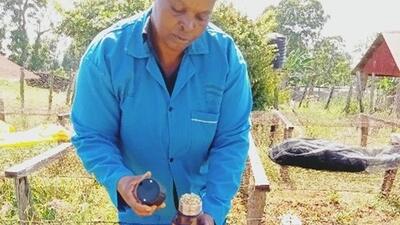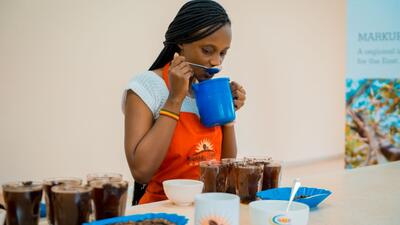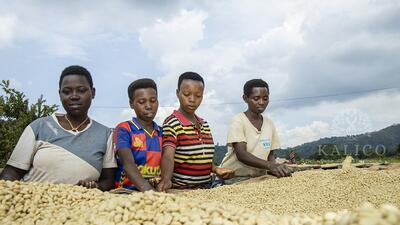

Stories
Story: Digital marketing strategy does the trick
20 October 2021
Small business from Burundi builds its online presence to tap the potential of international buyers
‘We have come a long way. Switching from word-of-mouth marketing to a solid marketing strategy has been a rewarding experience.” shared Lorraine Girinka.
Lorraine has an important job. She is the Digital Marketing Officer at Kahawa Link Company, also known as Kalico coffee.
Not very long ago, the women-led coffee exporter from north-eastern Burundi would sell coffee only to a tight network of clients.
Overcoming online shyness
Coffee roasters everywhere scout new business opportunities by scrolling and connecting through their social media walls and feeds. In order to compete, East African producers need to get out there and create a stir on social media.
However, it is easier said than done in Burundi, where less than 10% of the country’s population are social media users and internet penetration is slow.
Alexander, the company’s director and son of Kalico’s founder Angèle Ciza, recognized the opportunity to invest in marketing and branding strategies to expand the business’ reach as well as the network of potential buyers.
That is when he hired Lorraine, entrusting her with the development of the company’s online marketing strategy.
Learning the tricks of the trade
Kalico’s history of empowering women through coffee farming and its social commitment to improving the livelihood of female farmers makes it a unique specialty Arabica coffee producer.
In 2020, Kalico joined the marketing and branding training and coaching module for coffee enterprises organised by the International Trade Centre through the EU-EAC MARKUP programme.
With the support of Kalico’s leadership, Lorraine joined the coaching sessions and became sharper in identifying the target audience, listening to clients, and engaging with them to meet their needs.
The coaching programme aimed to put the pen back in the hand of exporters and empower them to tell their story.
Understanding the clients’ needs proved to be a key element for the success of the company, and through online surveys using social media channels, Lorraine was able to gather the necessary information about her clients’ wishes, their expectations and also their opinion on Kalico’s products. This information was then used to tailor content on social media and ensure better engagements.
Increased opportunities to do business
The support enabled Kalico to develop a strong branding for the company and to implement a social media approach.
With a 65 % engagement growth on the posts, and over 500 new followers on their social media, Kalico is ready to start conversations with new interested potential clients. By now, Kalico has been in touch with five new prospective clients who contacted them spontaneously on Instagram and other social media platforms.
Sharing is caring
Kalico has been actively sharing their experience using social media for marketing. with fellow enterprises in the region. Lorraine recently represented the company at a webinar organised by ITC’s SheTrades Rwanda during which she shared lessons learnt on how to best engage with customers.
With its new motto “Generations of experience, innovating Burundian coffee today” and a new digital marketing strategy, the company is reaching the next level by connecting to potential customers around the world.
She is now on a mission to make sure that Kalico does not go unnoticed by making a brand new website for the company.
Follow Kalico on Instagram!
About MARKUP
The European Union (EU) - East African Community (EAC) Market Access Upgrade Programme (MARKUP) is a regional trade development initiative, which aims to address both the supply side and market access constraints of selected key export-oriented sectors.
MARKUP aims to increase exports of agribusiness and horticultural products and promote regional integration and access to the European market by addressing specific challenges that small and medium enterprises, trade and investment support institutions and policy-makers face in accessing regional and EU export markets.
Funded by the EU, the programme is implemented by the Gesellschaft für Internationale Zusammenarbeit (GIZ), the International Trade Centre (ITC), the United Nations Industrial Development Organization (UNIDO), and other national partners.
‘We have come a long way. Switching from word-of-mouth marketing to a solid marketing strategy has been a rewarding experience.” shared Lorraine Girinka.
Lorraine has an important job. She is the Digital Marketing Officer at Kahawa Link Company, also known as Kalico coffee.
Not very long ago, the women-led coffee exporter from north-eastern Burundi would sell coffee only to a tight network of clients.
Overcoming online shyness
Coffee roasters everywhere scout new business opportunities by scrolling and connecting through their social media walls and feeds. In order to compete, East African producers need to get out there and create a stir on social media.
However, it is easier said than done in Burundi, where less than 10% of the country’s population are social media users and internet penetration is slow.
Alexander, the company’s director and son of Kalico’s founder Angèle Ciza, recognized the opportunity to invest in marketing and branding strategies to expand the business’ reach as well as the network of potential buyers.
That is when he hired Lorraine, entrusting her with the development of the company’s online marketing strategy.
Learning the tricks of the trade
Kalico’s history of empowering women through coffee farming and its social commitment to improving the livelihood of female farmers makes it a unique specialty Arabica coffee producer.
In 2020, Kalico joined the marketing and branding training and coaching module for coffee enterprises organised by the International Trade Centre through the EU-EAC MARKUP programme.
With the support of Kalico’s leadership, Lorraine joined the coaching sessions and became sharper in identifying the target audience, listening to clients, and engaging with them to meet their needs.
The coaching programme aimed to put the pen back in the hand of exporters and empower them to tell their story.
Understanding the clients’ needs proved to be a key element for the success of the company, and through online surveys using social media channels, Lorraine was able to gather the necessary information about her clients’ wishes, their expectations and also their opinion on Kalico’s products. This information was then used to tailor content on social media and ensure better engagements.
Increased opportunities to do business
The support enabled Kalico to develop a strong branding for the company and to implement a social media approach.
With a 65 % engagement growth on the posts, and over 500 new followers on their social media, Kalico is ready to start conversations with new interested potential clients. By now, Kalico has been in touch with five new prospective clients who contacted them spontaneously on Instagram and other social media platforms.
Sharing is caring
Kalico has been actively sharing their experience using social media for marketing. with fellow enterprises in the region. Lorraine recently represented the company at a webinar organised by ITC’s SheTrades Rwanda during which she shared lessons learnt on how to best engage with customers.
With its new motto “Generations of experience, innovating Burundian coffee today” and a new digital marketing strategy, the company is reaching the next level by connecting to potential customers around the world.
She is now on a mission to make sure that Kalico does not go unnoticed by making a brand new website for the company.
Follow Kalico on Instagram!
About MARKUP
The European Union (EU) - East African Community (EAC) Market Access Upgrade Programme (MARKUP) is a regional trade development initiative, which aims to address both the supply side and market access constraints of selected key export-oriented sectors.
MARKUP aims to increase exports of agribusiness and horticultural products and promote regional integration and access to the European market by addressing specific challenges that small and medium enterprises, trade and investment support institutions and policy-makers face in accessing regional and EU export markets.
Funded by the EU, the programme is implemented by the Gesellschaft für Internationale Zusammenarbeit (GIZ), the International Trade Centre (ITC), the United Nations Industrial Development Organization (UNIDO), and other national partners.




